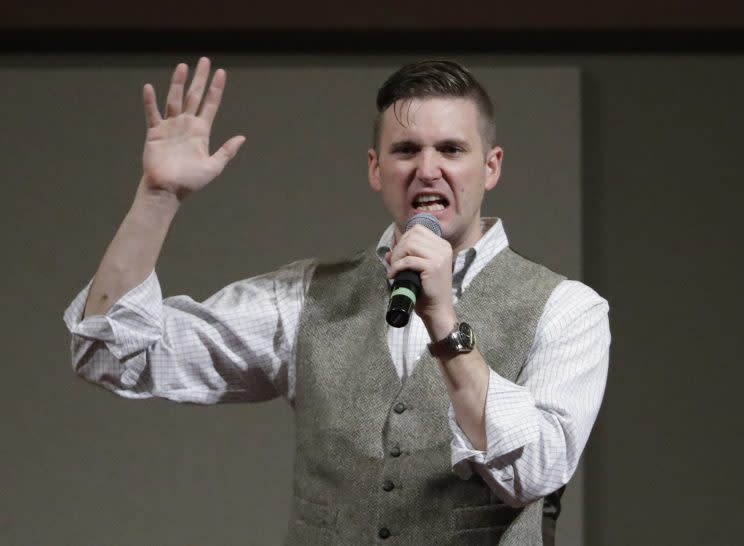The anthropologist of the alt-right: An interview with Angela Nagle

In August 2016, Hillary Clinton delivered a speech where she denounced the alt-right, the radical fringe that was taking over Republican politics. Time was spent both during the campaign and in the aftermath of President Trump’s election attempting to explain the alt-right, a phenomenon embracing everything from frog memes on Twitter to neo-Nazis giving the “Sieg heil” salute at a Washington conference.
Enter Angela Nagle, a Dublin-based writer and academic. Nagle has spent the last eight years studying online cultures like the alt-right, their various subgroups and their rivals on the left, essentially becoming an anthropologist looking into some of the darkest corners of the Internet. In her new book, Kill All Normies: Online Culture Wars From 4Chan and Tumblr to Trump and the Alt-Right, she lays out her findings. She spoke with Yahoo News about how she defines the groups, what they think of Trump’s presidency so far and how to deal with online abuse when you’re covering these types of communities.
Yahoo News: I think the best way to start for those who might not be familiar with this subject matter is the basic question of how do you define the alt-right?
Angela Nagle: Well if you ask the hardcore of the alt-right how they’d want to define it in terms of themselves, so they take a very strict definition. So they would say it would be people like Richard Spencer and the National Policy Institute, American Renaissance, people who want these particular goals like a white ethno-state. And they want to racially segregate society, essentially, and form an ethno-state. The media has tended to use a much broader definition to encompass everyone from [InfoWars host] Alex Jones to [former Breitbart staffer] Milo Yiannopoulos, and even [former Breitbart executive and current White House counselor] Steve Bannon.
I don’t think we should take their definition as the perfect one because why should we let them define the debate? But on the other hand sometimes I think it’s best to take the really strict definition because then you can avoid them being slippery about what they believe in. So in the strict sense the alt-right is a white nationalist or white segregationist kind of an ideology which is connected itself to various forums and online youth subcultures like 4chan and things like that.
In your book you use the term “alt light.” How would you describe them and what role do they play?
The alt light would be a pejorative term used by the alt-right to refer to people like Yiannapoulos, [Vice founder] Gavin McInnes, Mike Cernovich essentially all of the people closer to the kind of Breitbart side of things but who claim not to be racist. So the alt-right will say, quite comfortably, “Our politics is all about race,” while the alt light will say, “You know we are anti-racist and that’s why we don’t like identity politics.” They say they’re in favor of free speech and some kind of American nationalism and they accept the idea of American exceptionalism while the alt-right in the strict sense opposes it completely and says, “America is a racial nation pretending to be based on abstract ideas. “
One of the things you talk about is the banner that unites these different groups, and that is Trump. How are they reviewing the presidency so far?
They’re definitely disappointed in him because of the strikes in Syria, because of the pandering to Saudi Arabia and because he hasn’t really seen through any of the extreme anti-immigrant stuff that they hoped he would so far. In many ways the presidency is playing out at as a pretty typical presidency, it’s not as far right as they would have wanted.

If Trump can’t do it for them, where do these communities go going forward? Who do they look to, and for those who do have a political aim what’s their path for trying to enact it?
So far their whole approach has been there’s no point in just trying to move into formal politics; you have to change the culture. They’re constantly breaking taboos and making the way they speak about race more acceptable to pave the way for formal politics, trying to change the electorate. I mean NPI, Richard Spencer’s organization, is actually trying to be a policy institute — really propose particular policies — and while obviously they’re marginal, they are always kind of knocking on the door of establishment-right politics, showing up at CPAC and things like that.
So they definitely have aims in the long term to influence formal politics, but they’re still at the stage of influencing culture. In terms of policy, they would advocate for as little immigration as possible from outside of Europe and I think as little immigration as possible in general. To deport illegal immigrants and eventually to make it extremely difficult to gain citizenship, to incrementally have it so that the immigration rates to America fall.
People like Sean Hannity and others on the right have tried to make the “alt-left” a term. Is that a real thing and if it is how does it differ from the alt-right?
The alt-left is a term that has been used to mean very different things, but I think one particular interpretation is kind of taking over. I think what Sean Hannity means is just sort of loony left people…
Yeah, that kind of thing. I think now the term more often [describes] the socialist left, as I understand it. The anti-military-intervention, which would have been maybe Bernie Sanders supporters, and found itself very much in conflict with the liberal establishment left and liberal campus politics. It would describe people like [socialist outlet] Jacobin magazine, maybe [the podcast] Chapo Trap House, so I guess it would describe antiestablishment left.
How would you contrast the tactics between the two? Does the alt-left descend into the level of harassment we’ve seen during things like GamerGate?
No, they’re not similar at all. They’re only similar in that they’re both antiestablishment, they’re both kind of marginal and they both end up often making similar critiques of the liberal center. So there is this funny thing where people from the alt-right will end up sharing tweets from quite hard-left people not knowing what their background is. So journalists who have coined that are not making it up. I mean there is a real thing there, there is an antiestablishment left, but it doesn’t behave like the alt-right. It doesn’t make a habit of threatening people and harassing people over kind of culture wars issues.
You write about the symbiotic relations between the alt-right and what you call Tumblr left. How would you describe that group, why are they sort of feeding off each other in the way that you believe they are?
When I started looking at these things that I look at in the start of the book, they were all very much based on youth online subcultures. The people in them were quite young, you know, you’re talking about some teenagers, maybe early undergrads at most. So often on the right-wing kind of fan forums they would share images of people on Tumblr and the people on Tumblr would be very much into identity politics, they might be very playful about gender politics and taking, I suppose, cultural liberalism if you like to the next level.
But the style of politics that emerged from Tumblr went on to form the politics of the group of people who are now sort of in their mid-20s and so influenced campus culture hugely. If you look at the campus wars of last few years, the politics of the left-liberal side of the campus wars, anti-free-speech, people who demonstrated against visiting speakers like Christina Hoff Sommers or Milo — their style of politics was influenced by having sort of grown up on places like Tumblr.
You’ve talked about how these communities have coordinated to threaten people, especially women. Since you’ve started studying and writing about them, have you received threats or had to change your online style? How do you deal with this on a daily basis?
By the time I started really publishing stuff, enough journalists had been writing about the alt-right that I wasn’t the only one, so I’ve never become a central focus for them. I do of course get some abuse, they wrote about me on [the white supremacist website] Daily Stormer, for example and so I would get at least one abusive message every day, but I just block people. I have good security on all my social media stuff, I’m very private, I’m very careful and that’s about all I can do really.
What kind of feedback do you get from them?
A bunch of them gave my book one star on Amazon and wrote some bad reviews, but they were mostly funny, unintentionally funny. One of them was angry that I mixed Greek and Latin, for example, and it wasn’t even my term. They’re very protective of their subculture, so they tend to think you’re some kind of, like, careerist charlatan that’s trying to piggyback on their fame but if they knew, like, how little indie publishing earns you, they wouldn’t be worried about my motivations.
What got you started going down the path of studying this?
I did a PhD on a related topic, online anti-feminist movements. And the reason I wanted to study them was because I saw a kind of style of really antifeminist politics emerging that didn’t look like any previous antifeminism. It wasn’t Christian conservative, it wasn’t antiabortion, in fact it almost looks very countercultural — it looks like kind of almost punk as it’s irreverent, it’s rude, it’s kind of libertine, and I thought that was really interesting. I just had a sense it was going to go somewhere and then had a certain energy behind us, and so I just looked at all of those movements and they just grew and grew and then they started producing people like Elliot Rodger*, and increasingly the politics of race started to become more and more prominent. You even had, for example, big sort of antifeminist figures who are not anonymous, and many of them, they started to talk more and more about race and the idea of feminism as the agent of civilization collapse.
* Eliot Rodger killed six people at the University of California, Santa Barbara in 2014. Rodger killed himself, but left behind a manifesto full of misogynistic and racist writing.
Some of these communities contain a lot of rough stuff, as far as violent porn, language and abuse. How do you wind down after studying this?
I feel like I’ve started to wind down already. I’ve written a book about an eight-year or so period, and things change so fast in the cultures that I’m looking at, if you kind of look away for a minute it’s already changed. In some ways I feel like my book is out there and I’ve made a kind of contribution to understanding the subcultures.
When this story about the “OK” hand sign broke, I simply couldn’t bear, it was like listening to the same story for the hundredth time, I couldn’t bear to read it. They trick the media, the media thinks, “Oh no, we’ve been tricked, we have to show we’re kind of knowledgeable about this subculture,” and then in some way they reinforce the values of the subculture.
Read more from Yahoo News:



